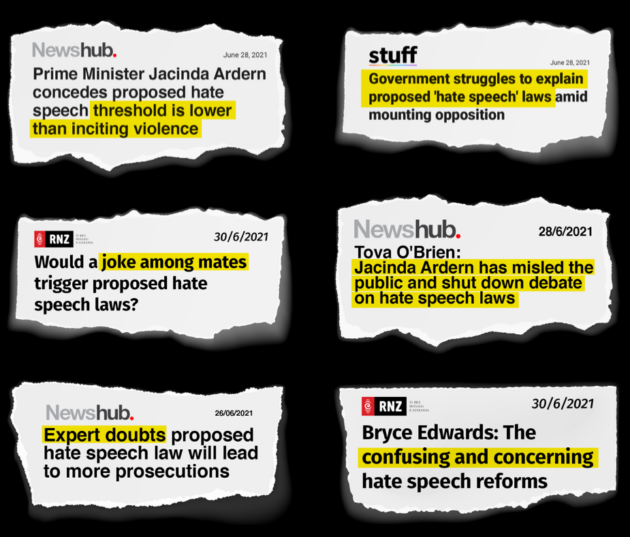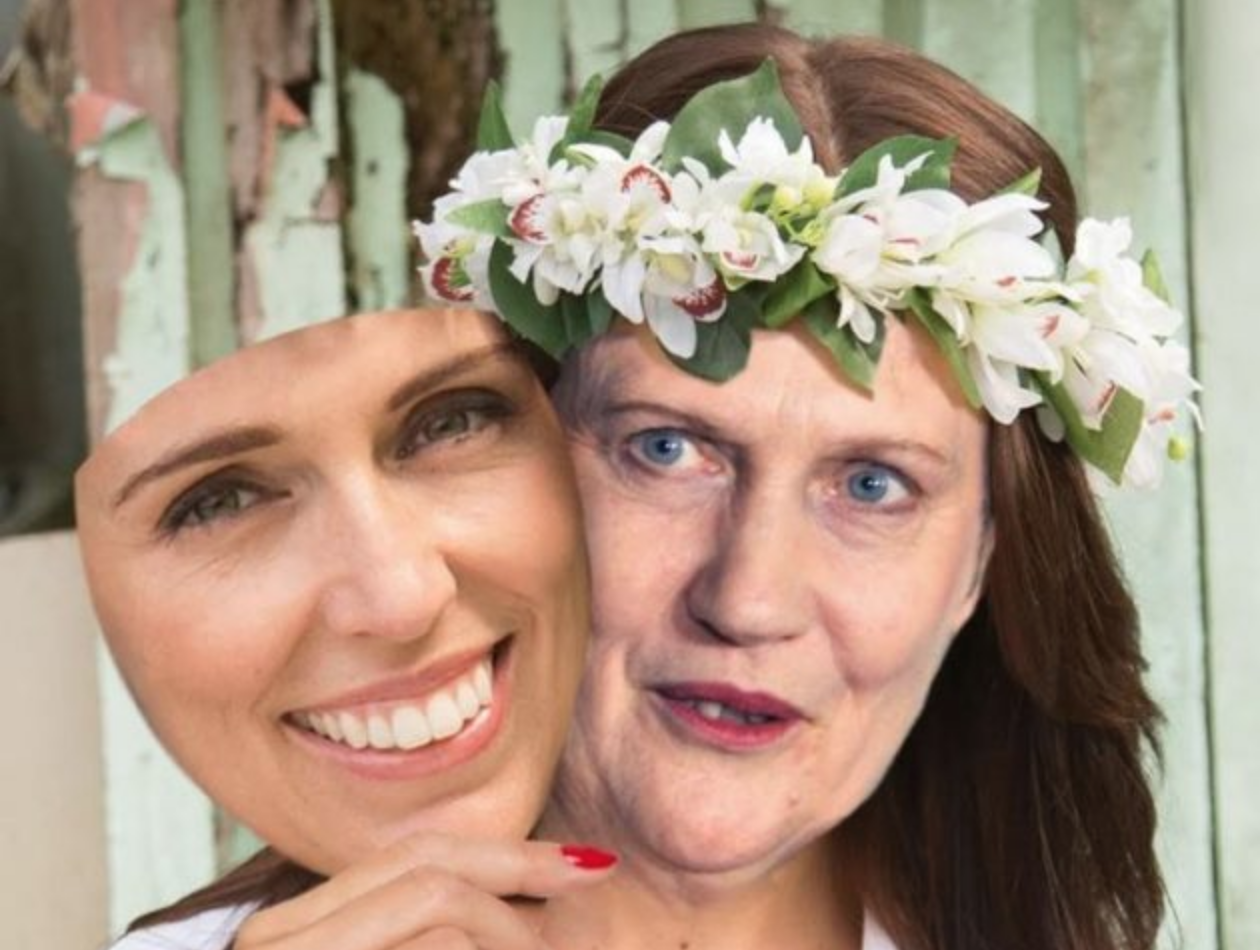When Jacinda Ardern and Kris Faafoi fronted media to explain their new hate speech laws they demonstrated a very sketchy understanding of their own recommendations. They were so bad that the bought and paid for (normally adoring) media were uncharacteristically critical.

“Not only is the Prime Minister wrong about the basic facts of the proposal, she was wrong to shut down debate on hate speech on The AM Show this morning with her glib, inaccurate dismissals.”
Tova O’Brien
Who foresaw that Tova O’Brien would finally wake up to Ardern’s shonky handling of the questions she doesn’t want to answer? I wondered where O’Brien went: was she abducted by aliens and replaced by a doppelgänger capable of recognising Ardern’s habitual obfuscation and diving for cover?
Admittedly, the interview came hard on the heels of Faafoi’s tragic appearance on Newshub Nation where he couldn’t provide a single example of the proposed hate speech law in practice.
“Faafoi said he was ‘not going to nickel and dime every case’, and it would be up to police whether to prosecute – the bar being whether the speech was inciting hatred towards a particular group. ‘I’m the Minister of Justice, I don’t get to decide that,’ he said.”
Justice Minister Kris Faafoi
Actually minister, your job is to write the law clearly and specifically and you simply cannot delegate this responsibility to the police whose job is to ensure people follow the law, not write it! Do you really need reminding that you are in government to thoroughly debate a proposed law before it becomes practice?
Given that these two big cheeses have no idea how the hate speech law actually works, whose idea is it?
Let’s start at the beginning. Following the Christchurch attacks in March 2019, the then Minister of Justice, Andrew Little, said he was considering making hate crime an offence.
A year later nothing was evident, but Little appeared slightly active in March 2020, the first anniversary of the Christchurch attacks.
“The review of our hate speech laws are in the final stages. I expect there will be an announcement in a matter of weeks.“
Although in this instance it is lucky for us that the government moves at glacial speed, instead of a matter of weeks it took another 15 months before the proposed changes to the incitement provisions in the Human Rights Act 1993 were released.
The community response was immediate, and the Christchurch Muslim community lodged three separate reports with police who are investigating terror threats.
“Federation of Islamic Associations chair Abdur Razzaq is responsible for one of the reports after he drew police attention to an offensive image on the online forum 4chan. The image is a selfie of a masked man posing in a car parked outside Al Noor Mosque, with accompanying comments that threatened violence to those inside.”
Razzaq asked for the hate speech law consultation period, ending 6 August, to be extended for a further month, presumably to gather more evidence of potential terrorists lurking at 4Chan, the same dark website used by Christchurch killer Brenton Tarrant before his attacks. But surely this work is best left to the investigative police instead of members of an already traumatised community?
The minister in charge of the GCSB and SIS, Andrew Little, indicated he was getting on with it (at glacial speed?), saying he has “a mandate to gather intelligence on terrorist threats and white identity extremist violence.”
The Muslim community’s lack of trust in the government’s ability to protect them from terrorist attacks is evident.
“The Islamic Women’s Council has said their warnings about growing anti-Muslim sentiment were ignored by authorities before the Christchurch mosque attacks.”
RNZ
It is very concerning that the Muslim community expects protection from the new hate speech laws which would not have protected them, or any other group, from Tarrant’s attack or a future attack.
“…we’ve seen no evidence that the Christchurch terrorist was encouraged by lax “hate speech” laws, or conversely that he would have been deterred by tougher ones. His realm was the dark web where the law is of no consequence. Would the massacres have been prevented if Labour’s hate speech laws were in place? Of course not. Brenton Tarrant was by definition an outlaw.”
Karl du Fresne argues that instead of hate speech law creating desired social cohesion, the crime of hate speech will further divide us.
“The people who risk being silenced under tougher ‘hate speech’ laws are not those who advocate violence and mayhem (which is a crime already), but those whose opinions and ideas are merely unfashionable or unpopular with the arbiters of ideological correctness.”
Karl du Fresne
In other words, du Fresne suggests the proposed law change is not so much about preventing another atrocity, but more about controlling public debate and confining it within parameters that government ideologues regard as acceptable.
So let’s get this straight: people say something about the proposed law that is not true, but don’t actually say what they think the law change will achieve? Interesting. Let’s apply that theory to the two major proponents of the law change.
The government says hate speech law will create social cohesion (which is not true), but don’t admit the proposed law will curtail public debate outside of areas they dictate.
Muslim leaders say hate speech will protect their community from terrorist attacks (which is not true), but don’t admit the proposed law will curtail public debate about Islam outside of the areas they dictate.
I think I get it now. But what about other religious groups like the Jews, who encounter anti-semitism, or Gloriavale, the religious sect under constant media scrutiny? Neither enjoys being publicly trashed, but they aren’t demanding tougher hate speech laws; they just want to quietly go about their business.
In fact, everyone else also wants to quietly go about their business without worrying if they might be heavily fined or chucked in prison for saying the ‘wrong’ thing.
Did someone outside government mastermind the implementation of the new hate speech law?
Consider the Helen Clark Foundation, launched in 2019 and joined with AUT to produce the “Anti-social Media: Reducing the Spread of Harmful Content on Social Media Networks” report. Well, what a surprise!
Coincidentally, the report addresses the Facebook live-streaming of the Christchurch killings and says more has to be done to address hate speech on social media. They say examination of social media platforms was outside the scope of the Royal Commission report into Christchurch.
Tarrant was active on 4Chan before he offended, so why didn’t the government consider his social media activity relevant to the Royal Commission?
Did someone else want more attention focused on social media than the Royal Commission could provide? Perhaps a separate, more in-depth study of social media would be better suited to implementing hate speech law?
The report gives full attention to social media hate speech and recommends the government “Carefully considers how hate speech and hate crimes are currently protected and prosecuted against under New Zealand law. The current definition which is limited to ‘racial disharmony’ is too narrow and fails to capture hate speech directed at religious groups, gender and LGBTI+ individuals.”
O’Brien might have obtained more coherent answers on the projected hate speech law from ‘Aunty Helen’, although it is doubtful Helen Clark would have admitted the proposed law would trigger the destruction of democracy and pave the way for a totalitarian government.
“The Government’s plan to criminalise free speech will not make New Zealand a safer and more tolerant society. Instead, it will rob New Zealanders of the ability to engage in robust debate and say what they think.”
Muriel Newman
You are forgiven for wondering who is running the country these days when the big cheeses don’t appear to know what they’re doing. Keep an eye on O’Brien’s loyalty to Ardern, because when she proves worthy of her journalistic credentials perhaps she will address Ardern’s childish game-playing and ask her to name the Christchurch killer.
Please share this article so that others can discover The BFD

